From Land Grab to LandBack
From LandBack to Abolition
Rematriation Futures
Fall 2023, Spring 2024, Spring 2025
Estudios de la Mujer y Genero, Departamento de Estudios Generales, Universidad de Puerto Rico-Rio Piedras
Graduate School of Architecture at the University of Johannesburg
Department of Architecture Iowa State University with support from the Center for Excellence in the Arts and Humanities
Loudreaders Trade School with support from the Mellon Foundation, re:arc institute, and ACSA Fellowship to Advance Equity in Architecture
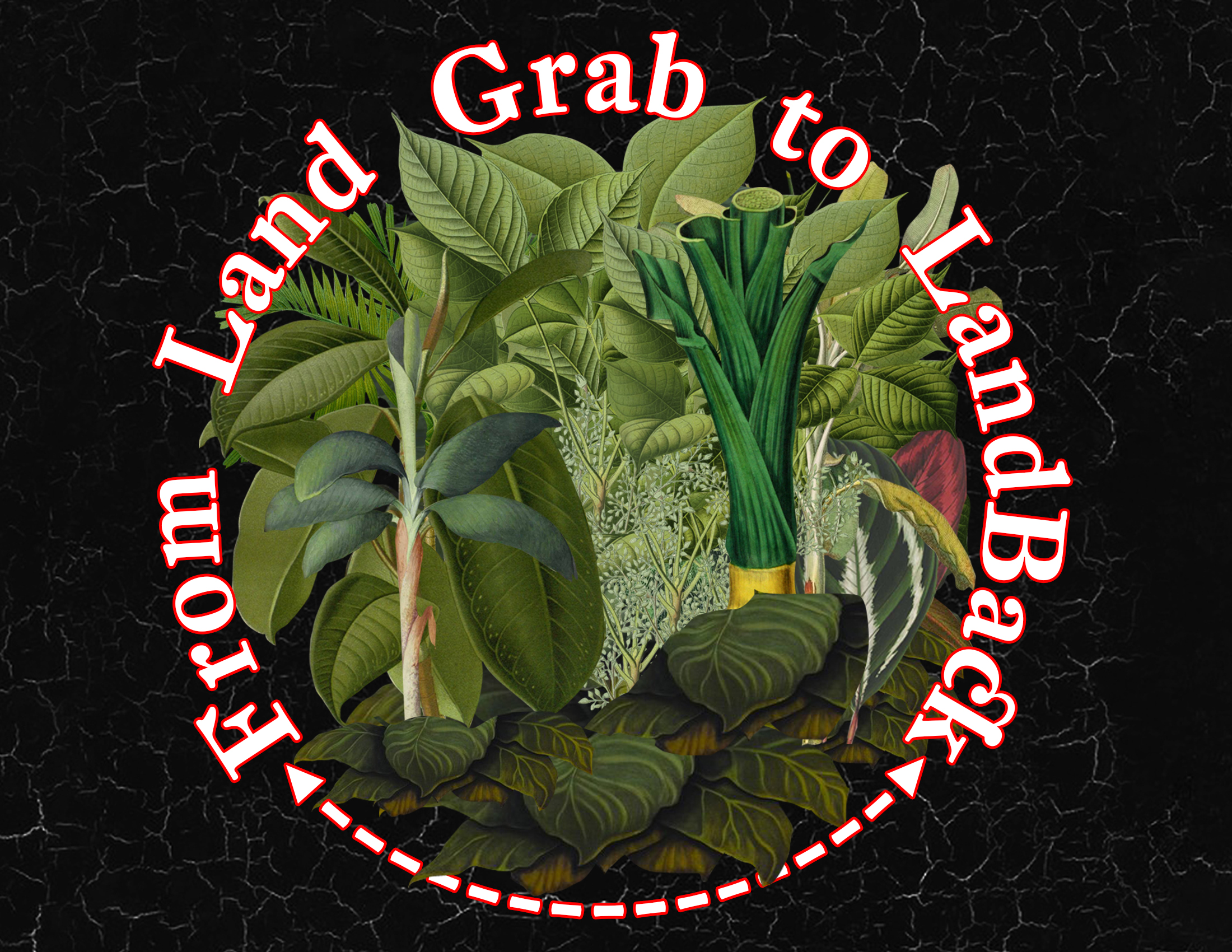
Monday, September 25
![]()
10:00am Shelley Buffalo (Meskwaki Nation), Decolonial Pathfinder (Lobby College of Design)
Register here.
11am Sean Connelly, Architect / Artist, Hawai’i (Online / Gallery College of Design)
Register here.
5pm Dima Srouji, Architect/ Designer, Palestine(Auditorium College of Design)
Register here.
Tuesday 26
10am Gabriela Leandro, Architect, Bahia, Brazil/ Loudreaders (Online)
Register here.
![]()
3pm Dima Srouji, Architect/ Designer, discussion with students
6pm Sikowis Nobiss (Nehiyaw/Nahkawiyinîwiw) Executive Director, Great Plains Action Society (Beckman Forum/ King Pavilion) ACSA Fellowship to Advance Equity in Architecture Lecture Register here.
Wednesday 27
![]()
11am Nell Gabiam and Abu Salma Khalil, ‘Yarmouk Camp, Palestine, and the War in Syria” (Gallery College of Design)
Register here.
12pmMaria Parazo Rose, spatial data analyst and journalist of Indigenous affairs, climate migration and conservation at Grist, discussion with students (Food and Science Building)
5pm Maria Parazo Rose, spatial data analyst and journalist of Indigenous affairs, climate migration and conservation at Grist, , Lecture (Auditorium College of Design) Register here.
Thursday 28
11 am - 12.10 pm Marakiani Olivieri, Architect, Vieques, Puerto Rico (auditorium College of Design)
Register here.
![]()
3pm Discussion with Maria Parazo Rose on journalist, data, research.
6pm Nadia Huggins, Artist, St. Vincent and the Grenadines, Lecture (online/Gallery) Register here.
Friday 29
10 am Oleksiy Radynski, Filmmaker, Ukraine (Online / Gallery)
Register here.
4pm Jason Fitzroy Jeffers, Filmmaker, Barbados (Auditorium)
Saturday 30
![]()
1pm Luis Othoniel Rosa, Writer, UNL (Black Contemporary) with poet and UNL professor Katie Marya
![]()
6pmAnthony Warrior ( Muscogee / Creek) (The Recipe, Ames)
Register here.
Call for Contributions
Scholars, designers, artists, authors, planners and activists are invited to submit proposals to participate in From Land Grab to Landback: Architecture and Positions on Land. A multimedia and interdisciplinary symposium spanning three continents, From Land grab to Landback explores the role of architecture and spatial practices in the politics of land and water rights, occupation, displacement, sovereignty, property, dispossession, reparations, ecological spoliation, capital, wealth accumulation and distribution, production, and on-going struggles against settler colonialism. The symposium seeks to bring together diverse perspectives on how the built and destroyed environment shape and are shaped by power relations, struggles for land rights, stewardship, and extraction, and alternative visions of land use and custodianship.
Co-organized by the Department of Architecture at Iowa State University with support from the Center for Excellence in the Arts and Humanities, ACSA Fellowship to Advance Equity in Architecture, the School of Architecture of the Universidad de Puerto Rico-Rio Piedras, Graduate School of Architecture at Johannesburg, and Loudreaders with support from the Mellon Foundation, re:arc institute and Producer Hub, the symposium is part of a series of events, exhibitions, roundtables, and publications to be celebrated in Ames (USA), Rio Piedras (Puerto Rico), and Johannesburg (South Africa).
Abstracts of 300-500 words should address one or more of the following themes:
Histories and geographies of land grab and dispossession
The spatial dimensions of land struggles and resistance
Architecture and design as instruments of colonization and resistance
Reimagining land use
Afroindigenous and indigenous perspectives on land, space, and architecture
Global and local struggles for landback and reparations
Intersectional approaches to land justice and environmental racism
Interdisciplinary perspectives that center contemporary struggles against settler-colonialism and projects that draw on fields such as architecture, urban planning, landscape architecture, geography, history, anthropology, environmental studies, and Indigenous studies are strongly encouraged to apply.
Please submit your abstract and/or proposal by June 20, 2023 to contact@loudreaders.com, subject: land symposium application, including your name, affiliation, and contact information in a pdf (2mb max).
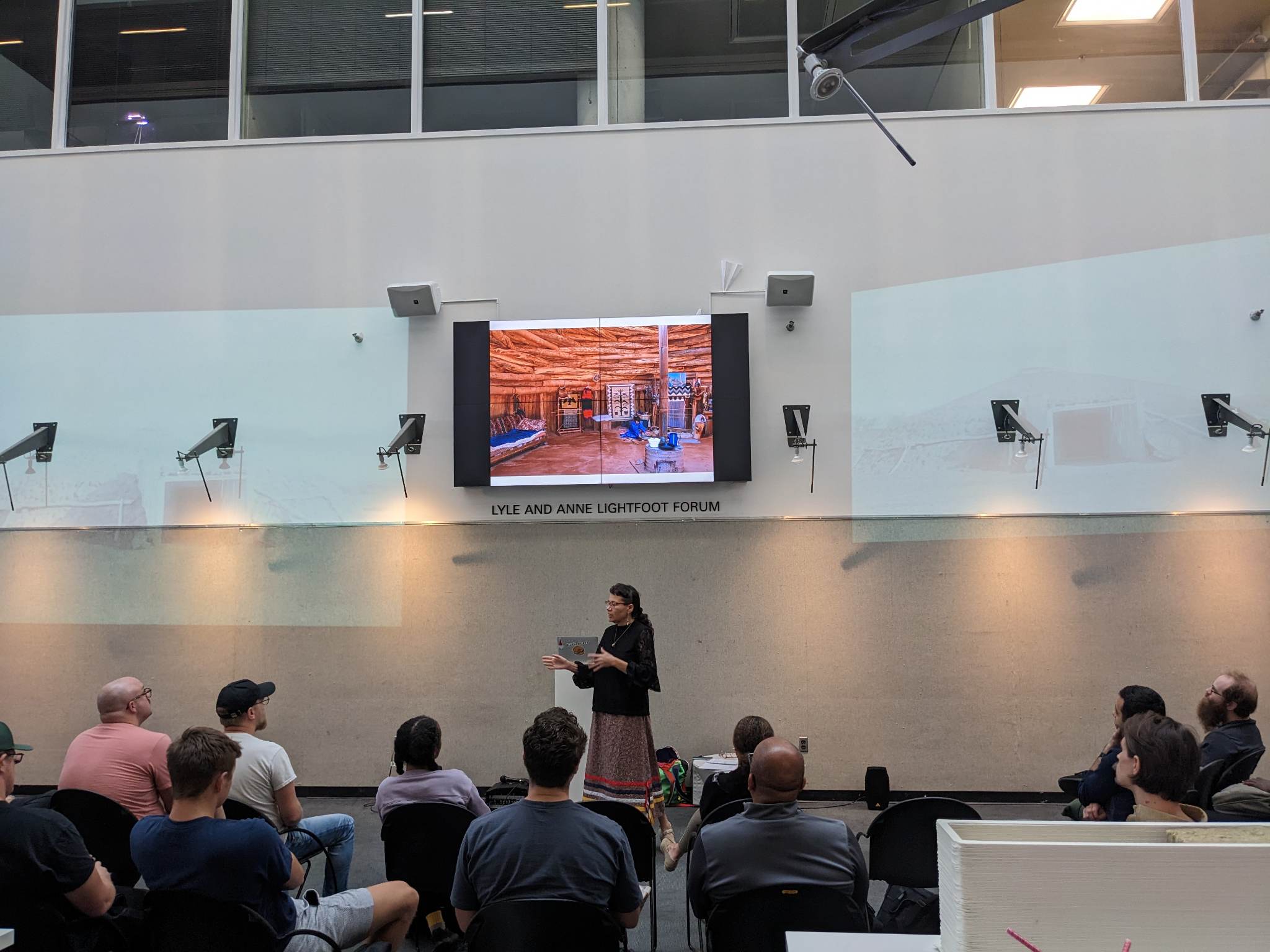
From Land Grab to LandBack: Shelley Buffalo from WAI Think Tank on Vimeo.
10:00am Shelley Buffalo (Meskwaki Nation), Decolonial Pathfinder (Lobby College of Design)
Register here.
11am Sean Connelly, Architect / Artist, Hawai’i (Online / Gallery College of Design)
Register here.
5pm Dima Srouji, Architect/ Designer, Palestine(Auditorium College of Design)
Register here.
Tuesday 26
10am Gabriela Leandro, Architect, Bahia, Brazil/ Loudreaders (Online)
Register here.
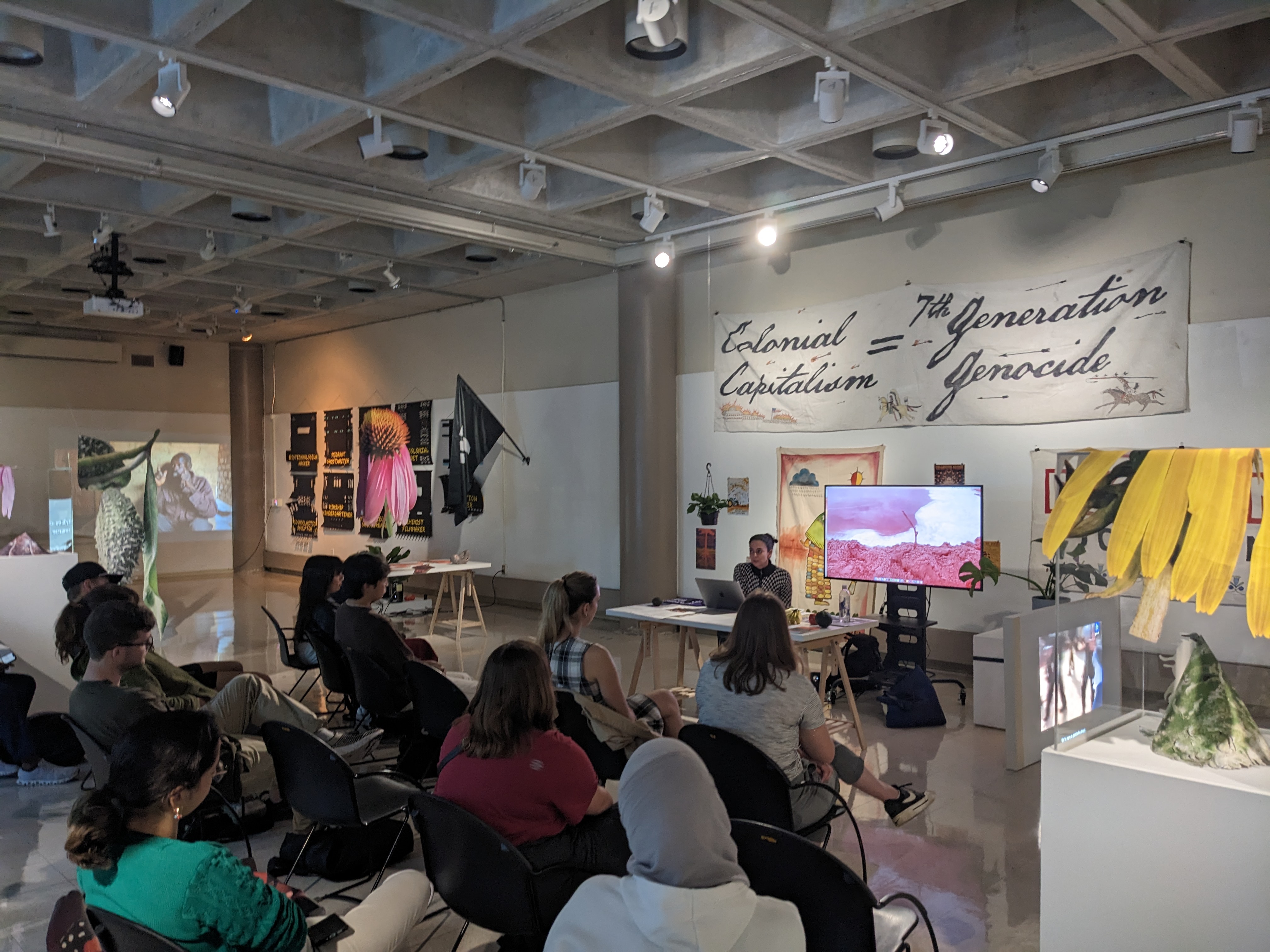
3pm Dima Srouji, Architect/ Designer, discussion with students
6pm Sikowis Nobiss (Nehiyaw/Nahkawiyinîwiw) Executive Director, Great Plains Action Society (Beckman Forum/ King Pavilion) ACSA Fellowship to Advance Equity in Architecture Lecture Register here.
Wednesday 27
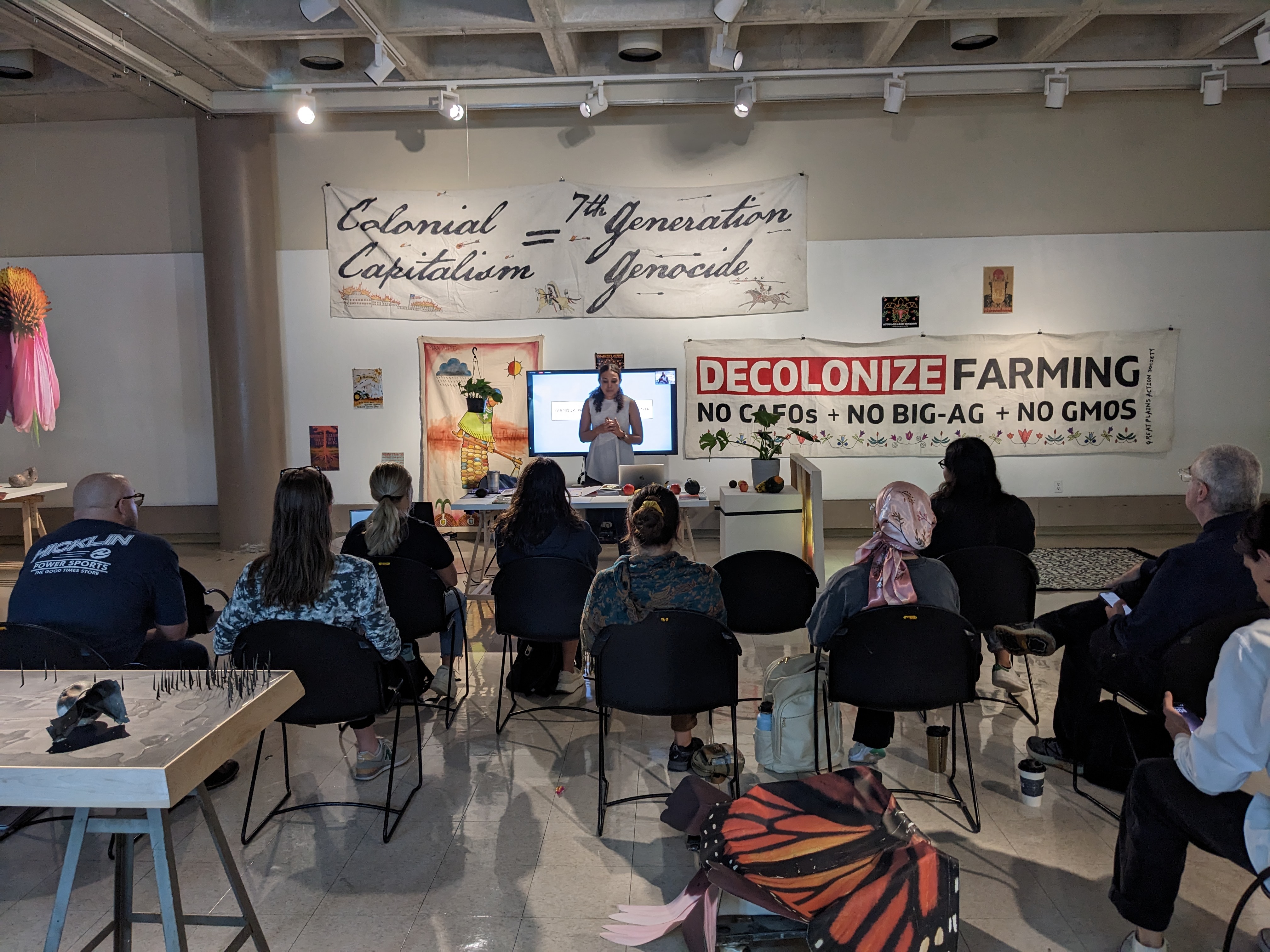
11am Nell Gabiam and Abu Salma Khalil, ‘Yarmouk Camp, Palestine, and the War in Syria” (Gallery College of Design)
Register here.
12pmMaria Parazo Rose, spatial data analyst and journalist of Indigenous affairs, climate migration and conservation at Grist, discussion with students (Food and Science Building)
5pm Maria Parazo Rose, spatial data analyst and journalist of Indigenous affairs, climate migration and conservation at Grist, , Lecture (Auditorium College of Design) Register here.
Thursday 28
11 am - 12.10 pm Marakiani Olivieri, Architect, Vieques, Puerto Rico (auditorium College of Design)
Register here.
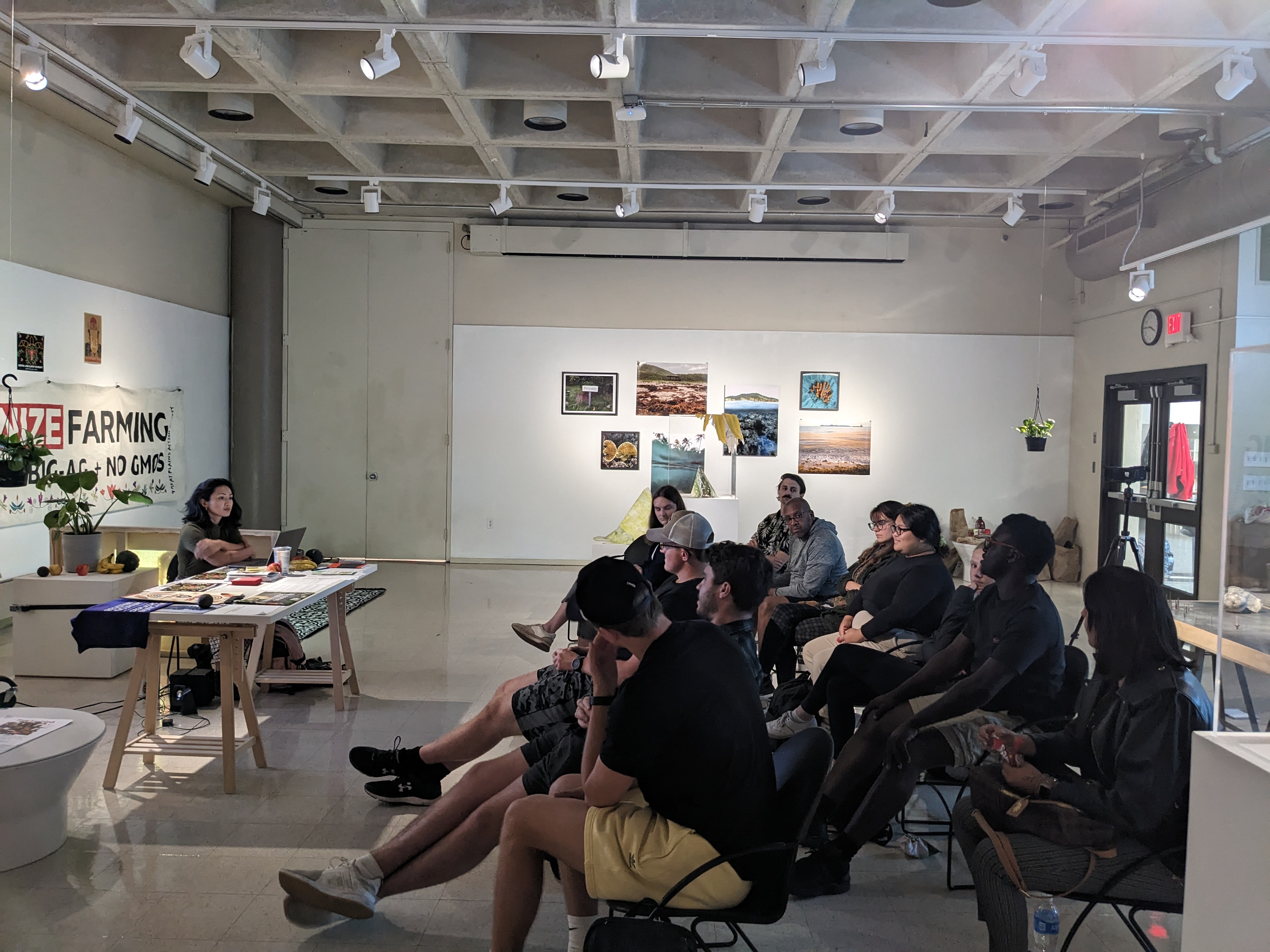
3pm Discussion with Maria Parazo Rose on journalist, data, research.
6pm Nadia Huggins, Artist, St. Vincent and the Grenadines, Lecture (online/Gallery) Register here.
Friday 29
10 am Oleksiy Radynski, Filmmaker, Ukraine (Online / Gallery)
Register here.
4pm Jason Fitzroy Jeffers, Filmmaker, Barbados (Auditorium)
Saturday 30
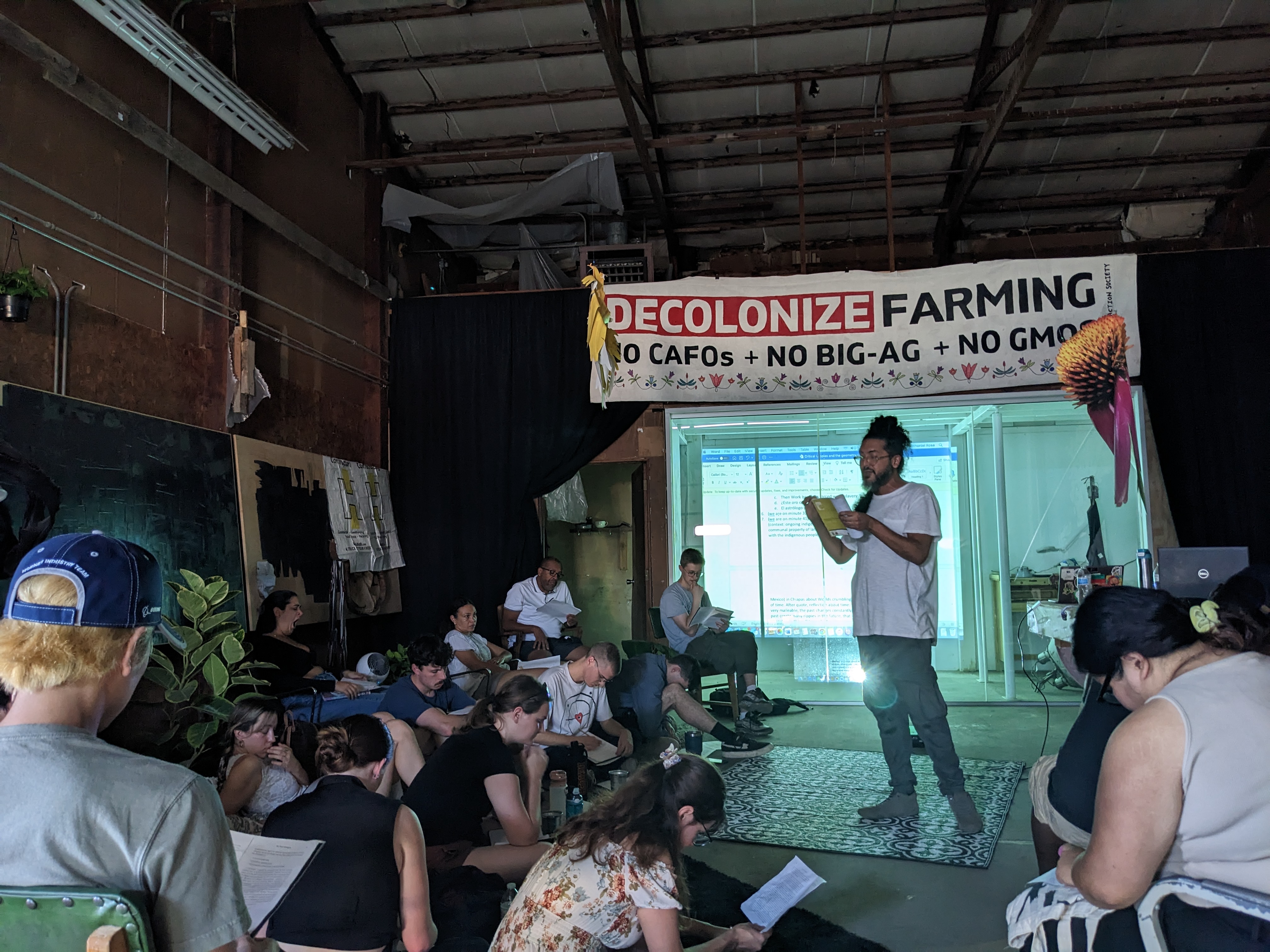
1pm Luis Othoniel Rosa, Writer, UNL (Black Contemporary) with poet and UNL professor Katie Marya
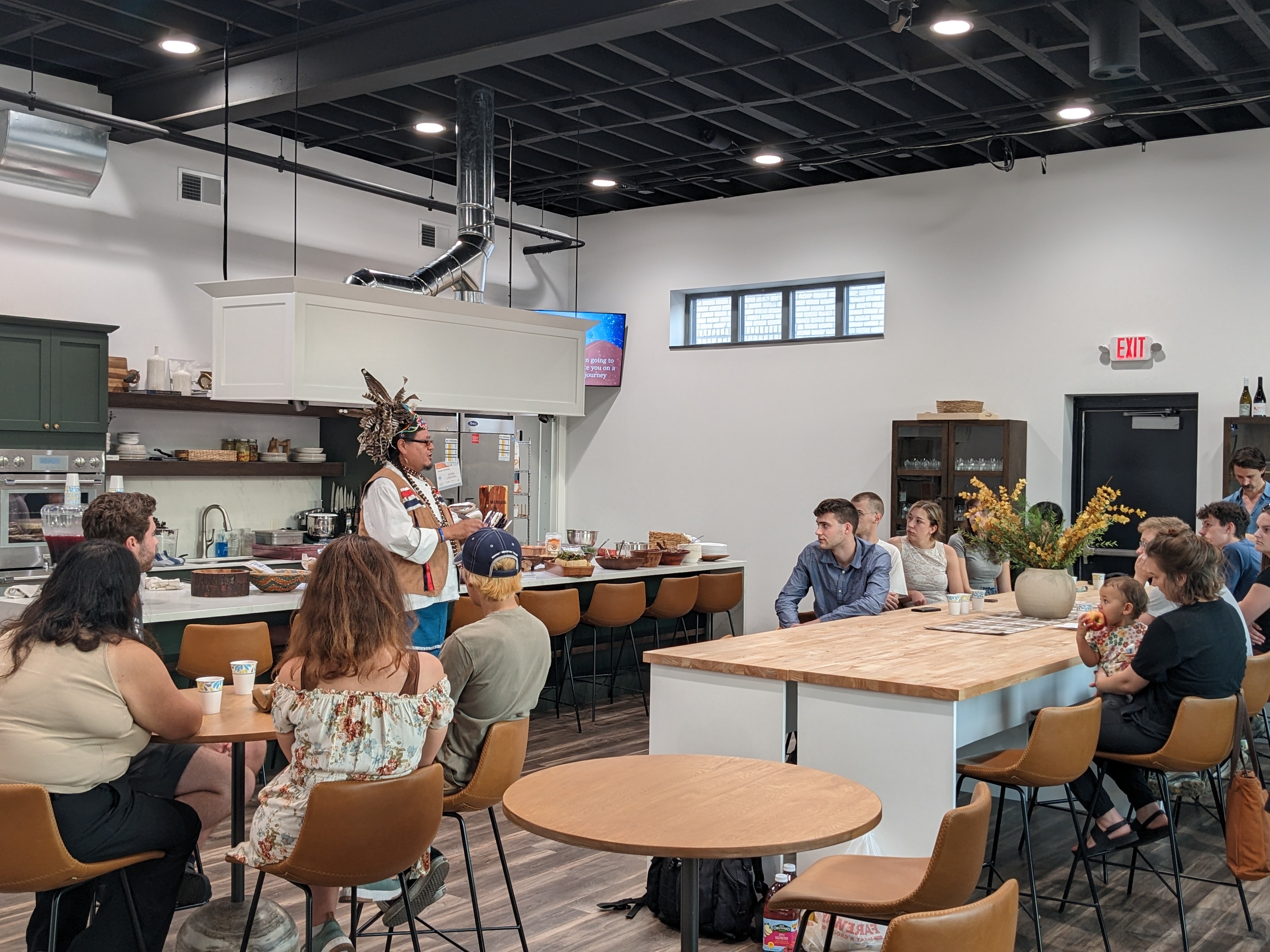
6pmAnthony Warrior ( Muscogee / Creek) (The Recipe, Ames)
Register here.
Call for Contributions
Scholars, designers, artists, authors, planners and activists are invited to submit proposals to participate in From Land Grab to Landback: Architecture and Positions on Land. A multimedia and interdisciplinary symposium spanning three continents, From Land grab to Landback explores the role of architecture and spatial practices in the politics of land and water rights, occupation, displacement, sovereignty, property, dispossession, reparations, ecological spoliation, capital, wealth accumulation and distribution, production, and on-going struggles against settler colonialism. The symposium seeks to bring together diverse perspectives on how the built and destroyed environment shape and are shaped by power relations, struggles for land rights, stewardship, and extraction, and alternative visions of land use and custodianship.
Co-organized by the Department of Architecture at Iowa State University with support from the Center for Excellence in the Arts and Humanities, ACSA Fellowship to Advance Equity in Architecture, the School of Architecture of the Universidad de Puerto Rico-Rio Piedras, Graduate School of Architecture at Johannesburg, and Loudreaders with support from the Mellon Foundation, re:arc institute and Producer Hub, the symposium is part of a series of events, exhibitions, roundtables, and publications to be celebrated in Ames (USA), Rio Piedras (Puerto Rico), and Johannesburg (South Africa).
Abstracts of 300-500 words should address one or more of the following themes:
Histories and geographies of land grab and dispossession
The spatial dimensions of land struggles and resistance
Architecture and design as instruments of colonization and resistance
Reimagining land use
Afroindigenous and indigenous perspectives on land, space, and architecture
Global and local struggles for landback and reparations
Intersectional approaches to land justice and environmental racism
Interdisciplinary perspectives that center contemporary struggles against settler-colonialism and projects that draw on fields such as architecture, urban planning, landscape architecture, geography, history, anthropology, environmental studies, and Indigenous studies are strongly encouraged to apply.
Please submit your abstract and/or proposal by June 20, 2023 to contact@loudreaders.com, subject: land symposium application, including your name, affiliation, and contact information in a pdf (2mb max).
Spring 2025
Rematriation Futures
Futuros de rematriación
![]()
Rematriation Futures is a transdisciplinary symposium and multimedia platform that investigates and offers critical perspectives and questions on the relationship between design, ecological justice, and the feminist practice of rematriation. Facing some of the most pressing questions of our times, Rematriation Futures investigates the intersection of architecture, agroecology, activism, land, and territory in relation to food sovereignty and the architectures of landback, and ecological regeneration.
In response to planetary-scale calls for social and ecological justice, Rematriation Futures investigates architecture's relationship to material manifestation of systems of power, occupation, and extraction and to imaginaries and practices of resistance, regeneration, and repair. Drawing from the work of leading activists, designers, planners, artists, and scholars across various disciplines, the symposium invites questions, approaches, and imaginaries in and about land while centering Indigenous, alternative, ancestral, and futurist knowledge and practices.
Through a series of talks, film screenings, roundtable discussions, and workshops, Rematriation Futures engages with many temporalities while looking at the past, present, and future of critical questions on land, architecture, and rematriation.
This program recognizes the urgent need to challenge ongoing colonial legacies and envision a future where Indigenous communities are at the forefront of land stewardship and cultural revitalization. It seeks to examine how architecture can support and amplify these efforts, moving beyond its historical complicity in colonization and dispossession. By analyzing the connections between land, food, and self-determination, the program will investigate how rematriation can contribute to decolonizing food systems and fostering food sovereignty.
This program is the third in a series of transdisciplinary events, following "From Landgrab to Landback" and "From Landback to Abolition." It aims to create a space for critical dialogue and knowledge sharing among scholars, activists, architects, artists, and community members. This platform will facilitate conversations about the complexities and possibilities of rematriation, encouraging collective action towards a more just and equitable future.
Futuros de rematriación
Futuros de rematriación es un simposio transdisciplinario y una plataforma multimedia que investiga y ofrece perspectivas y preguntas críticas sobre la relación entre el diseño, la justicia ecológica y la práctica feminista de la rematriación. Enfrentando algunas de las preguntas más urgentes de nuestro tiempo, Futuros de rematriación investiga la intersección de la arquitectura, la agroecología, el activismo, la tierra y el territorio en relación con la soberanía alimentaria y las arquitecturas de recuperación de la tierra y la regeneración ecológica.
En respuesta a los llamados a escala planetaria por la justicia social y ecológica, Futuros de rematriación investiga la relación de la arquitectura con la manifestación material de los sistemas de poder, ocupación y extracción y con los imaginarios y prácticas de resistencia, regeneración y reparación. A partir del trabajo de activistas, diseñadores, planificadores, artistas y académicos líderes de varias disciplinas, el simposio invita a plantear preguntas, enfoques e imaginarios en y sobre la tierra, al tiempo que se centra en el conocimiento y las prácticas indígenas, alternativas, ancestrales y futuristas. A través de una serie de charlas, proyecciones de películas, mesas redondas y talleres, Futuros de rematriación aborda muchas temporalidades mientras observa el pasado, el presente y el futuro de cuestiones críticas sobre la tierra, la arquitectura y la rematriación.
Este programa reconoce la necesidad urgente de desafiar los legados coloniales en curso e imaginar un futuro en el que las comunidades indígenas estén a la vanguardia de la administración de la tierra y la revitalización cultural. Busca examinar cómo la arquitectura puede apoyar y amplificar estos esfuerzos, yendo más allá de su complicidad histórica en la colonización y el despojo. Al analizar las conexiones entre la tierra, los alimentos y la autodeterminación, el programa investigará cómo la rematriación puede contribuir a descolonizar los sistemas alimentarios y fomentar la soberanía alimentaria.
Este programa es el tercero de una serie de eventos transdisciplinarios, después de "De la desposesión a la restitución " y "De la restitución a la abolición". Su objetivo es crear un espacio para el diálogo crítico y el intercambio de conocimientos entre académicos, activistas, arquitectos, artistas y miembros de la comunidad. Esta plataforma facilitará conversaciones sobre las complejidades y posibilidades de la rematriación, fomentando la acción colectiva hacia un futuro más justo y equitativo.
![]()
Friday, April 11
10am Online
Zoom Registration
https://iastate.zoom.us/meeting/register/VXlQoVv8T0mSX5SijGfNtA
Introduction to Planetary Rematriation Futures
Pluma Barbara Moreno, Pueblo Can Jibaro and Indigenous School of Lares
Natalia Santos, Professor of Human Rights doing Research of the Rights to Food in PR
Julio Cesar Hernandez, Food Security & Agricultural Research Data Center UPR Mayaguez
Ahmad Hneiti, Agriculture and Demography Researcher
Faiq Mari, Architect, Educator, and Researcher
Haifa Saleh, PhD Researcher, Anti-Colonial Indigenous Practices for Social-Ecological Spatial Justice, KU Leuven
Layan Salameh, Architect / Researcher / Designer
Nur Jabarin, PhD Student, Columbia University
Alexandra Pagan, Writer, Director Women and Gender Studies UPR
Saturday, April 12
10am King Pavilion
Questioning Pipelines and Examining Carbon Offsets
10:30am King Pavilion
Aissa Dearing, PhD Candidate, University of Oxford
Carolyn Raffensperger, Executive Director, Science and Environmental Health Network
Sunshine Thomas-Bear, Tribal Historic Preservation Officer, Winnebago Nation
Moderator: Sikowis Nobiss, Executive Director, Great Plains Action Society
Strategies for Indigenous-Led Stewardship, Cultural Revitalization,
and Healing Justice
1:00pm King Pavilion
Sikowis Nobiss, Executive Director, Great Plains Action Society
Kevin Abourezk, Deputy Managing Editor, Indian Country Today
Eric Anglada, Honor Native Land Fund
Faiq Mari, Architect, Educator, and Researcher
Moderator: Cruz Garcia
Exploring the Matriarchy in Rematriation
2:30pm King Pavilion
Karen Mackey, Community Organizer
Jessica Engelking, Representation Director, Great Plains Action Society
Lestina Saul, LADC, CA, Nebraska Urban Indian Health Coalition
Moderator: Nathalie Frankowski
Stewarding Foods for Change
4:00pm King Pavilion
Felicia Pieper, Global Food Project
Steven Roach, Food Animal Concerns Trust
Mariolga Reyes Cruz, Ecofeminist community psychologist, agroecology promoter, and filmmaker
Moderator: Sikowis Nobiss, Executive Director, Great Plains Action Society
Sunday, April 13
10am Black Contemporary
Exhibition opening; 'Machines...and Ideas to Postpone the End of the World'
Works by Dan Roche, Andrew Santa Lucia, and Lane Rick, Nora Akawi, Eduardo Rega Calvo, Daniel Ruiz, and Rami Nakhleh, Pete Goche, Post-Novis (Christopher Rey Perez, Rose Florian, Luis Othoniel Rosa, Holly Craig, Ophelia S. Chan, Hilary Weise, Coco Allred, WAI Think Tank) Traumnovelle, Kristen Mimms Scavnicky, Evan Hume.
Performances by Ritwik Banerji and Firat Erdim: Kite Choir + Field Harp Public Rehearsal
1pm The Recipe, Ames
Presentation on Indigenous Food Pathways
Chef Anthony Warrior
2:00pm The Recipe, Ames
Closing Discussion
Sikowis Nobiss, Nur Jabarin, Layan Salameh, Alexandra Pagan, WAI Think Tank
Zoom registration:
https://iastate.zoom.us/meeting/register/LT7QLoihRcSLe5JgJOJd8g
Spring 2024
From LandBack to Abolition
De la restitución a la abolición
![]()
From LandBack to Abolition
While Land Grab is part of the extractive logic of capitalism, with its systems of accumulation, toxicity, and incarceration, LandBack seeks forms of redistribution, rematriation, and abolition. In the face of imperial and colonial military escalation, and the expansion of the prison-complex into perpetual states of exception at the planetary scale, abolitionist imaginaries point towards futures of social and ecological justice and the collective emancipation of the oppressed peoples of the world. Building on the foundations of “From Land Grab to LandBack,” From LandBack to Abolition outlines infrastructures of resistance and the architectures of worldmaking. Through a series of talks, film screenings, roundtable discussions, and workshops From LandBack to Abolition interrogates the many intersections between anti-colonial struggles, and abolitionist practices.
De la restitución a la abolición
Si bien la desposesión es parte de la lógica extractiva del capitalismo, con sus sistemas de acumulación, toxicidad y encarcelamiento, la restitución (LandBack) busca formas de redistribución, rematriación y abolición. Frente a la escalada militar imperial y colonial, y la expansión del complejo penitenciario hacia perpetuos estados de excepción a escala planetaria, los imaginarios abolicionistas apuntan hacia futuros de justicia social y ecológica y la emancipación colectiva de los pueblos oprimidos del mundo. Partiendo de los cimientos de “From Land Grab to LandBack” (de destitución a restitución) , De la restitución a la abolición (From LandBack to Abolition) describe las infraestructuras de resistencia y las arquitecturas de la creación del mundo. A través de una serie de charlas, proyecciones de películas, mesas redondas y talleres, De la restitución a la abolición interroga las numerosas intersecciones entre las luchas anticoloniales y las prácticas abolicionistas.
From LandGrab to Abolition
Universidad de Puerto Rico
Co-organized by Department of Women’s and Gender Studies at the Universidad de Puerto Ric:
Fecha: 8 de febrero de 2024
Horario: 1:00 a 6:00 p.m.
Lugar/plataforma: Anfiteatro #2
Modalidad: Presencial
Tipo de actividad: Conversatorio
Departamento: Estudios de Mujer y Género
Descripción: En continuación a la actividad del semestre anterior (De la desposesión a
la restitución) convocamos un junte multidisciplinario que, bajo el concepto de la
abolición y los ángulos de raza y género, atenderemos temas de territorialidad,
incluyendo el genocidio en Palestina.
Programa
1-1:30 Saludos
1:30- 2:00 Marili Pizarro (poesía y performance)
2:00- 3:00- Panel sobre el abolicionismo:
Sofía V. Delgado Torres
Victoria King Martínez
Paulina G. Seneriz Gómez
Ariana S. Villegas Cruz
(Catherine Marsh, moderadora)
2:30- 3:50- Papel Machete, presentación y conversatorio con Jorge Díaz, director
artístico y otres
(Alexandra Pagán, moderadora)
4:00- 5:20- panel con Mariana Iriarte y Natalia Ibrahim Abufarah Dávila
sobre Palestina
(moderador Cruz García)
5:30- 6:00- presentación de Informa (Revista), Luis Othoniel Rosa, Nora Akawi, Ilze Wolff, Nathalie Frankowski y Cruz García
--
Fall 2023
From Land Grab to Landback is a transdisciplinary symposium and multimedia platform that investigates and offers critical perspectives that tie architecture across different scales to urgent questions about land, territory, property, sovereignty, ecology, and life. In response to planetary-scale calls for social and ecological justice, architecture is called to confront its legacy as the material manifestation of systems of power, occupation, territorialization, extraction, capture, identity, development, and modernity. Drawing from the work, research, and practices of leading international designers, planners, artists, political-scientists, anthropologists, scholars, journalists, philosophers, and activists, the symposium provides an intersectional approach to questions about land, and the many struggles that ensue during an era of technological escalation and ecological urgency. Through a series of talks, film screenings, roundtable discussions, and workshops From Landgrab to Land back: architecture and positions on land engages with many temporalities while looking at the past and present of critical questions on land and architecture. The symposium offers a platform for the presentation and dissemination of critical imaginaries operating in the immediate and distant future.
Rematriation Futures
Futuros de rematriación

Rematriation Futures is a transdisciplinary symposium and multimedia platform that investigates and offers critical perspectives and questions on the relationship between design, ecological justice, and the feminist practice of rematriation. Facing some of the most pressing questions of our times, Rematriation Futures investigates the intersection of architecture, agroecology, activism, land, and territory in relation to food sovereignty and the architectures of landback, and ecological regeneration.
In response to planetary-scale calls for social and ecological justice, Rematriation Futures investigates architecture's relationship to material manifestation of systems of power, occupation, and extraction and to imaginaries and practices of resistance, regeneration, and repair. Drawing from the work of leading activists, designers, planners, artists, and scholars across various disciplines, the symposium invites questions, approaches, and imaginaries in and about land while centering Indigenous, alternative, ancestral, and futurist knowledge and practices.
Through a series of talks, film screenings, roundtable discussions, and workshops, Rematriation Futures engages with many temporalities while looking at the past, present, and future of critical questions on land, architecture, and rematriation.
This program recognizes the urgent need to challenge ongoing colonial legacies and envision a future where Indigenous communities are at the forefront of land stewardship and cultural revitalization. It seeks to examine how architecture can support and amplify these efforts, moving beyond its historical complicity in colonization and dispossession. By analyzing the connections between land, food, and self-determination, the program will investigate how rematriation can contribute to decolonizing food systems and fostering food sovereignty.
This program is the third in a series of transdisciplinary events, following "From Landgrab to Landback" and "From Landback to Abolition." It aims to create a space for critical dialogue and knowledge sharing among scholars, activists, architects, artists, and community members. This platform will facilitate conversations about the complexities and possibilities of rematriation, encouraging collective action towards a more just and equitable future.
Futuros de rematriación
Futuros de rematriación es un simposio transdisciplinario y una plataforma multimedia que investiga y ofrece perspectivas y preguntas críticas sobre la relación entre el diseño, la justicia ecológica y la práctica feminista de la rematriación. Enfrentando algunas de las preguntas más urgentes de nuestro tiempo, Futuros de rematriación investiga la intersección de la arquitectura, la agroecología, el activismo, la tierra y el territorio en relación con la soberanía alimentaria y las arquitecturas de recuperación de la tierra y la regeneración ecológica.
En respuesta a los llamados a escala planetaria por la justicia social y ecológica, Futuros de rematriación investiga la relación de la arquitectura con la manifestación material de los sistemas de poder, ocupación y extracción y con los imaginarios y prácticas de resistencia, regeneración y reparación. A partir del trabajo de activistas, diseñadores, planificadores, artistas y académicos líderes de varias disciplinas, el simposio invita a plantear preguntas, enfoques e imaginarios en y sobre la tierra, al tiempo que se centra en el conocimiento y las prácticas indígenas, alternativas, ancestrales y futuristas. A través de una serie de charlas, proyecciones de películas, mesas redondas y talleres, Futuros de rematriación aborda muchas temporalidades mientras observa el pasado, el presente y el futuro de cuestiones críticas sobre la tierra, la arquitectura y la rematriación.
Este programa reconoce la necesidad urgente de desafiar los legados coloniales en curso e imaginar un futuro en el que las comunidades indígenas estén a la vanguardia de la administración de la tierra y la revitalización cultural. Busca examinar cómo la arquitectura puede apoyar y amplificar estos esfuerzos, yendo más allá de su complicidad histórica en la colonización y el despojo. Al analizar las conexiones entre la tierra, los alimentos y la autodeterminación, el programa investigará cómo la rematriación puede contribuir a descolonizar los sistemas alimentarios y fomentar la soberanía alimentaria.
Este programa es el tercero de una serie de eventos transdisciplinarios, después de "De la desposesión a la restitución " y "De la restitución a la abolición". Su objetivo es crear un espacio para el diálogo crítico y el intercambio de conocimientos entre académicos, activistas, arquitectos, artistas y miembros de la comunidad. Esta plataforma facilitará conversaciones sobre las complejidades y posibilidades de la rematriación, fomentando la acción colectiva hacia un futuro más justo y equitativo.

Friday, April 11
10am Online
Zoom Registration
https://iastate.zoom.us/meeting/register/VXlQoVv8T0mSX5SijGfNtA
Introduction to Planetary Rematriation Futures
Pluma Barbara Moreno, Pueblo Can Jibaro and Indigenous School of Lares
Natalia Santos, Professor of Human Rights doing Research of the Rights to Food in PR
Julio Cesar Hernandez, Food Security & Agricultural Research Data Center UPR Mayaguez
Ahmad Hneiti, Agriculture and Demography Researcher
Faiq Mari, Architect, Educator, and Researcher
Haifa Saleh, PhD Researcher, Anti-Colonial Indigenous Practices for Social-Ecological Spatial Justice, KU Leuven
Layan Salameh, Architect / Researcher / Designer
Nur Jabarin, PhD Student, Columbia University
Alexandra Pagan, Writer, Director Women and Gender Studies UPR
Saturday, April 12
10am King Pavilion
Questioning Pipelines and Examining Carbon Offsets
10:30am King Pavilion
Aissa Dearing, PhD Candidate, University of Oxford
Carolyn Raffensperger, Executive Director, Science and Environmental Health Network
Sunshine Thomas-Bear, Tribal Historic Preservation Officer, Winnebago Nation
Moderator: Sikowis Nobiss, Executive Director, Great Plains Action Society
Strategies for Indigenous-Led Stewardship, Cultural Revitalization,
and Healing Justice
1:00pm King Pavilion
Sikowis Nobiss, Executive Director, Great Plains Action Society
Kevin Abourezk, Deputy Managing Editor, Indian Country Today
Eric Anglada, Honor Native Land Fund
Faiq Mari, Architect, Educator, and Researcher
Moderator: Cruz Garcia
Exploring the Matriarchy in Rematriation
2:30pm King Pavilion
Karen Mackey, Community Organizer
Jessica Engelking, Representation Director, Great Plains Action Society
Lestina Saul, LADC, CA, Nebraska Urban Indian Health Coalition
Moderator: Nathalie Frankowski
Stewarding Foods for Change
4:00pm King Pavilion
Felicia Pieper, Global Food Project
Steven Roach, Food Animal Concerns Trust
Mariolga Reyes Cruz, Ecofeminist community psychologist, agroecology promoter, and filmmaker
Moderator: Sikowis Nobiss, Executive Director, Great Plains Action Society
Sunday, April 13
10am Black Contemporary
Exhibition opening; 'Machines...and Ideas to Postpone the End of the World'
Works by Dan Roche, Andrew Santa Lucia, and Lane Rick, Nora Akawi, Eduardo Rega Calvo, Daniel Ruiz, and Rami Nakhleh, Pete Goche, Post-Novis (Christopher Rey Perez, Rose Florian, Luis Othoniel Rosa, Holly Craig, Ophelia S. Chan, Hilary Weise, Coco Allred, WAI Think Tank) Traumnovelle, Kristen Mimms Scavnicky, Evan Hume.
Performances by Ritwik Banerji and Firat Erdim: Kite Choir + Field Harp Public Rehearsal
1pm The Recipe, Ames
Presentation on Indigenous Food Pathways
Chef Anthony Warrior
2:00pm The Recipe, Ames
Closing Discussion
Sikowis Nobiss, Nur Jabarin, Layan Salameh, Alexandra Pagan, WAI Think Tank
Zoom registration:
https://iastate.zoom.us/meeting/register/LT7QLoihRcSLe5JgJOJd8g
Spring 2024
From LandBack to Abolition
De la restitución a la abolición
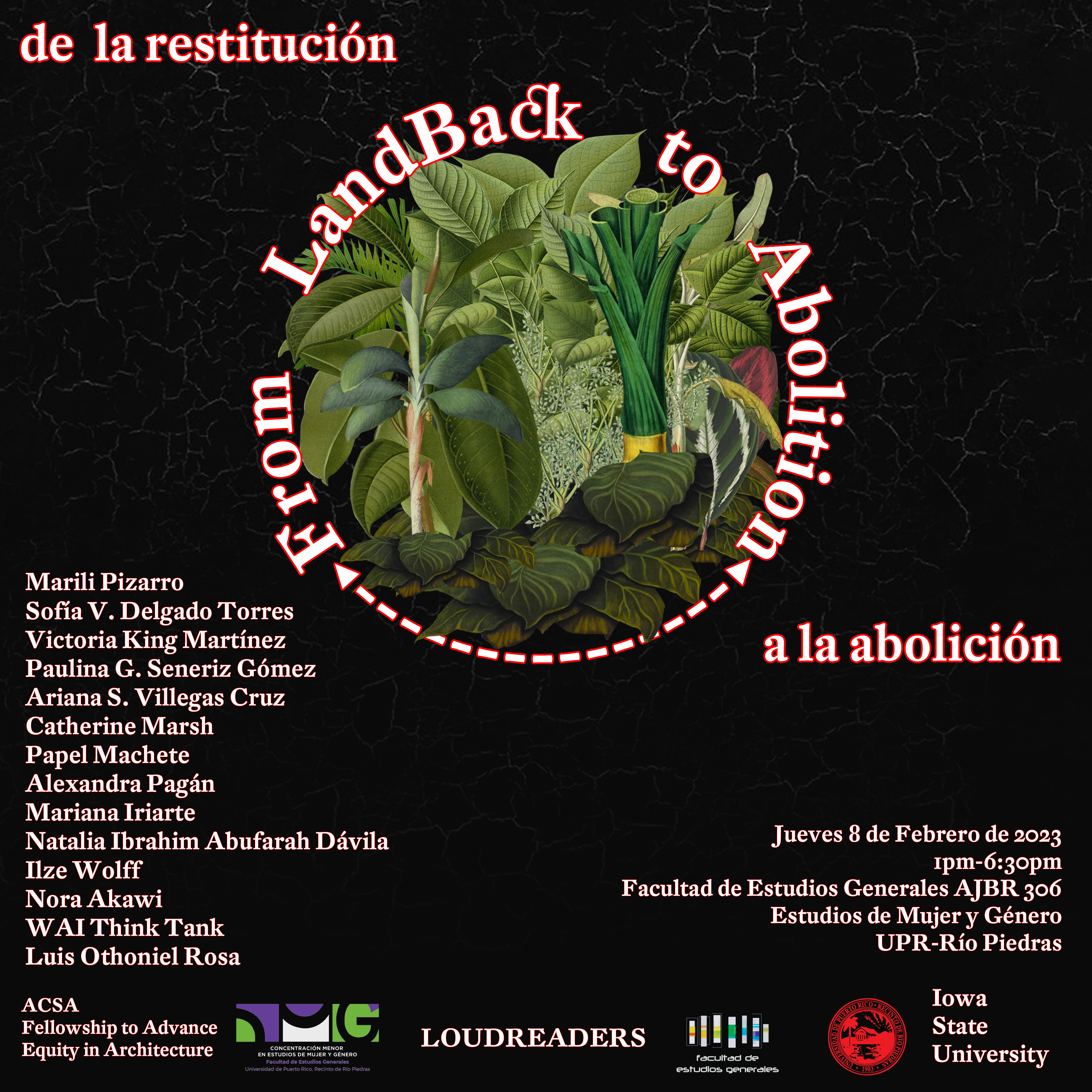
From LandBack to Abolition
While Land Grab is part of the extractive logic of capitalism, with its systems of accumulation, toxicity, and incarceration, LandBack seeks forms of redistribution, rematriation, and abolition. In the face of imperial and colonial military escalation, and the expansion of the prison-complex into perpetual states of exception at the planetary scale, abolitionist imaginaries point towards futures of social and ecological justice and the collective emancipation of the oppressed peoples of the world. Building on the foundations of “From Land Grab to LandBack,” From LandBack to Abolition outlines infrastructures of resistance and the architectures of worldmaking. Through a series of talks, film screenings, roundtable discussions, and workshops From LandBack to Abolition interrogates the many intersections between anti-colonial struggles, and abolitionist practices.
De la restitución a la abolición
Si bien la desposesión es parte de la lógica extractiva del capitalismo, con sus sistemas de acumulación, toxicidad y encarcelamiento, la restitución (LandBack) busca formas de redistribución, rematriación y abolición. Frente a la escalada militar imperial y colonial, y la expansión del complejo penitenciario hacia perpetuos estados de excepción a escala planetaria, los imaginarios abolicionistas apuntan hacia futuros de justicia social y ecológica y la emancipación colectiva de los pueblos oprimidos del mundo. Partiendo de los cimientos de “From Land Grab to LandBack” (de destitución a restitución) , De la restitución a la abolición (From LandBack to Abolition) describe las infraestructuras de resistencia y las arquitecturas de la creación del mundo. A través de una serie de charlas, proyecciones de películas, mesas redondas y talleres, De la restitución a la abolición interroga las numerosas intersecciones entre las luchas anticoloniales y las prácticas abolicionistas.
From LandGrab to Abolition
Universidad de Puerto Rico
Co-organized by Department of Women’s and Gender Studies at the Universidad de Puerto Ric:
Fecha: 8 de febrero de 2024
Horario: 1:00 a 6:00 p.m.
Lugar/plataforma: Anfiteatro #2
Modalidad: Presencial
Tipo de actividad: Conversatorio
Departamento: Estudios de Mujer y Género
Descripción: En continuación a la actividad del semestre anterior (De la desposesión a
la restitución) convocamos un junte multidisciplinario que, bajo el concepto de la
abolición y los ángulos de raza y género, atenderemos temas de territorialidad,
incluyendo el genocidio en Palestina.
Programa
1-1:30 Saludos
1:30- 2:00 Marili Pizarro (poesía y performance)
2:00- 3:00- Panel sobre el abolicionismo:
Sofía V. Delgado Torres
Victoria King Martínez
Paulina G. Seneriz Gómez
Ariana S. Villegas Cruz
(Catherine Marsh, moderadora)
2:30- 3:50- Papel Machete, presentación y conversatorio con Jorge Díaz, director
artístico y otres
(Alexandra Pagán, moderadora)
4:00- 5:20- panel con Mariana Iriarte y Natalia Ibrahim Abufarah Dávila
sobre Palestina
(moderador Cruz García)
5:30- 6:00- presentación de Informa (Revista), Luis Othoniel Rosa, Nora Akawi, Ilze Wolff, Nathalie Frankowski y Cruz García
--
Fall 2023
From Land Grab to Landback is a transdisciplinary symposium and multimedia platform that investigates and offers critical perspectives that tie architecture across different scales to urgent questions about land, territory, property, sovereignty, ecology, and life. In response to planetary-scale calls for social and ecological justice, architecture is called to confront its legacy as the material manifestation of systems of power, occupation, territorialization, extraction, capture, identity, development, and modernity. Drawing from the work, research, and practices of leading international designers, planners, artists, political-scientists, anthropologists, scholars, journalists, philosophers, and activists, the symposium provides an intersectional approach to questions about land, and the many struggles that ensue during an era of technological escalation and ecological urgency. Through a series of talks, film screenings, roundtable discussions, and workshops From Landgrab to Land back: architecture and positions on land engages with many temporalities while looking at the past and present of critical questions on land and architecture. The symposium offers a platform for the presentation and dissemination of critical imaginaries operating in the immediate and distant future.
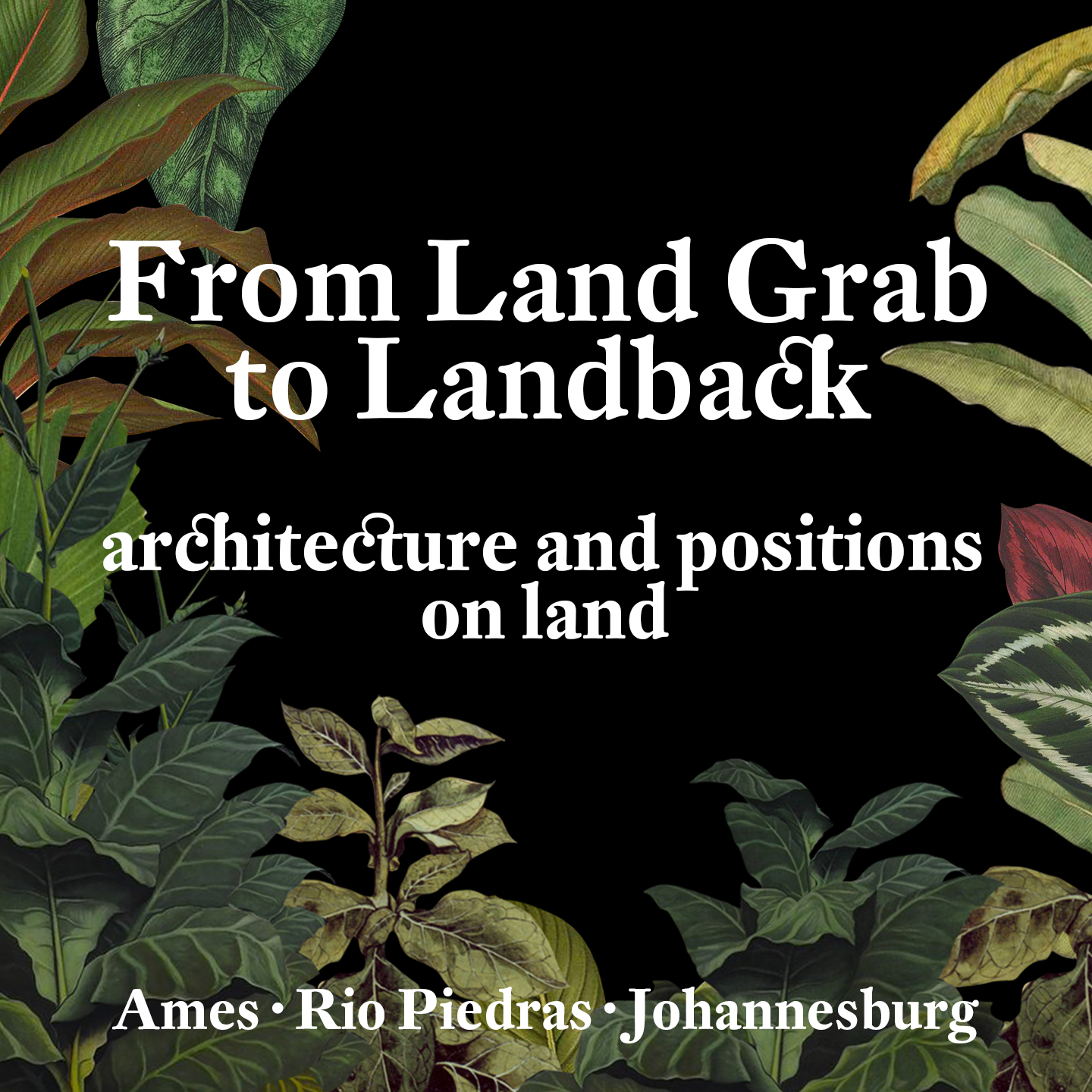
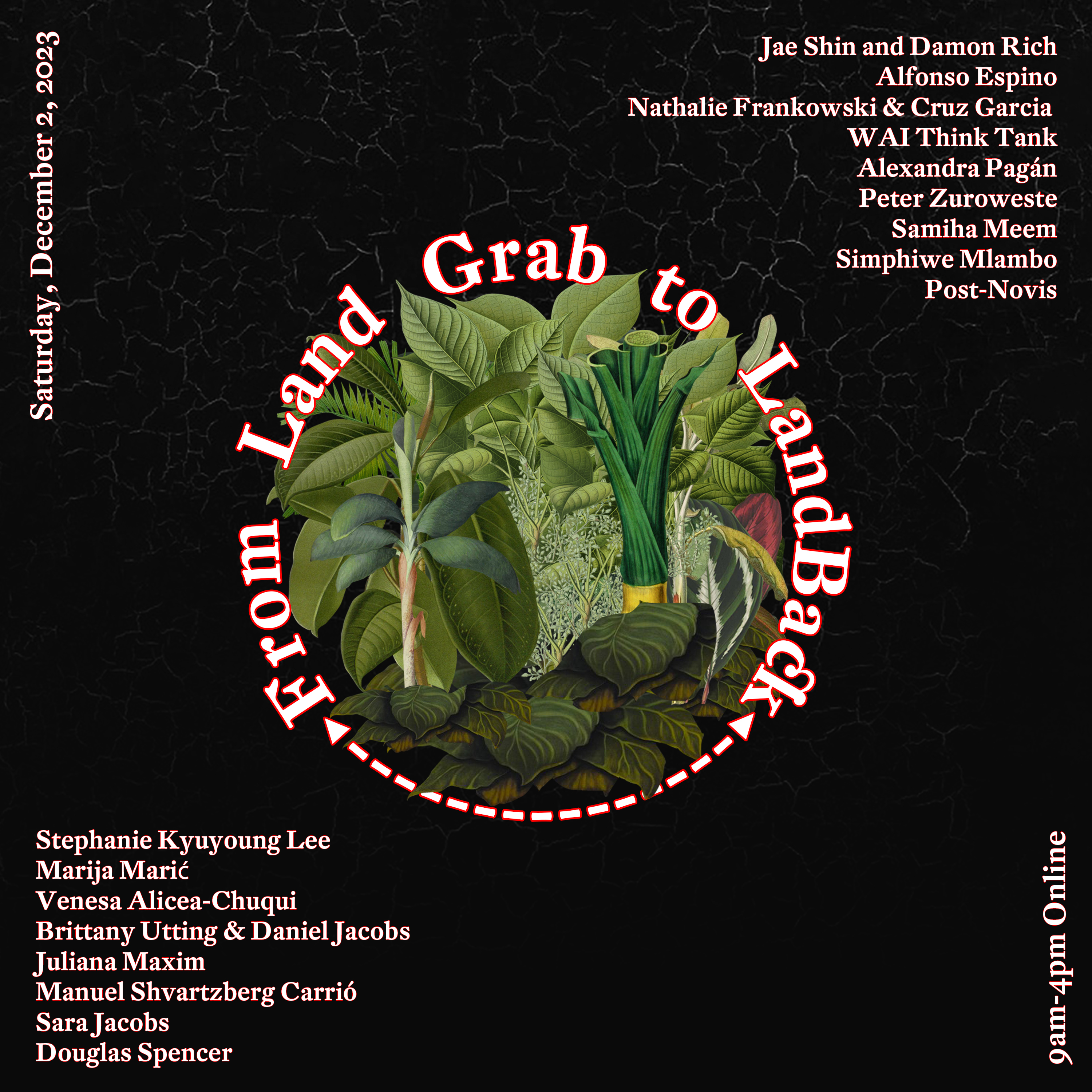
Register for From Land Grab to LandBack IV
Program
9:00am CT
Opening and welcome
Douglas Spencer
9:10am Perspectives from Puerto Rico, Johannesburg and Iowa Nathalie Frankowski and Cruz Garcia with Alexandra Pagan, Simphiwe Mlambo, Samiha Meem, Post-Novis
10:00am
panel 1
Chair: Douglas Spencer
“Hard Labour/Soft Space” Stephanie Kyuyoung Lee, Bard College
“On Moon, Comradeship, and Possibilities of Landback Beyond Earth” Marija Marić, University of Luxembourg
“From Land to Power: Strengthening Community Resilience” Venesa Alicea-Chuqui, Kean University
12.00pm
panel 2
Chair: Peter Zuroweste
“The Field Station: From Dispossession to Decolonization” Brittany Utting, Rice University and Daniel Jacobs, University of Houston,
“Unceded: a Long History of Land in Rural Southern California”Juliana Maxi, University of San Diego
“Inland Empire: On Legal and Architectural Orders”: Manuel Shvartzberg Carrió
2:00pm
panel 3
Chair: Nathalie Frankowski
“Landscape Architecture, Extractive Entanglements, and the Settler State in 20th Century British Columbia” Sara Jacobs, University of British Columbia
“Pathologies and Production: Capital, Land, and Landscape”
Douglas Spencer, Iowa State University.
“Landback Is Not a Metaphor” Jae Shin and Damon Rich, HECTOR urban design
Alfonso Espino, Globeville Elyria Swansea Coalition
3:30pm
Discussion and closing remarks
Program
9:00am CT
Opening and welcome
Douglas Spencer
9:10am Perspectives from Puerto Rico, Johannesburg and Iowa Nathalie Frankowski and Cruz Garcia with Alexandra Pagan, Simphiwe Mlambo, Samiha Meem, Post-Novis
10:00am
panel 1
Chair: Douglas Spencer
“Hard Labour/Soft Space” Stephanie Kyuyoung Lee, Bard College
“On Moon, Comradeship, and Possibilities of Landback Beyond Earth” Marija Marić, University of Luxembourg
“From Land to Power: Strengthening Community Resilience” Venesa Alicea-Chuqui, Kean University
12.00pm
panel 2
Chair: Peter Zuroweste
“The Field Station: From Dispossession to Decolonization” Brittany Utting, Rice University and Daniel Jacobs, University of Houston,
“Unceded: a Long History of Land in Rural Southern California”Juliana Maxi, University of San Diego
“Inland Empire: On Legal and Architectural Orders”: Manuel Shvartzberg Carrió
2:00pm
panel 3
Chair: Nathalie Frankowski
“Landscape Architecture, Extractive Entanglements, and the Settler State in 20th Century British Columbia” Sara Jacobs, University of British Columbia
“Pathologies and Production: Capital, Land, and Landscape”
Douglas Spencer, Iowa State University.
“Landback Is Not a Metaphor” Jae Shin and Damon Rich, HECTOR urban design
Alfonso Espino, Globeville Elyria Swansea Coalition
3:30pm
Discussion and closing remarks
Presentations by Pedro Cardona Roig, Organizacion del Pueblo Indigena Can-Jibaro de Borike, El Hangar en Santurce, Colectiva Feminista en Construccion, Rocio Zambrana, and Marakiani Olivier. Co-organized by Estudios de la Mujer y Genero, Estudios Generales Universidad de Puerto Rico-Rio Piedras, September 15, 2023.
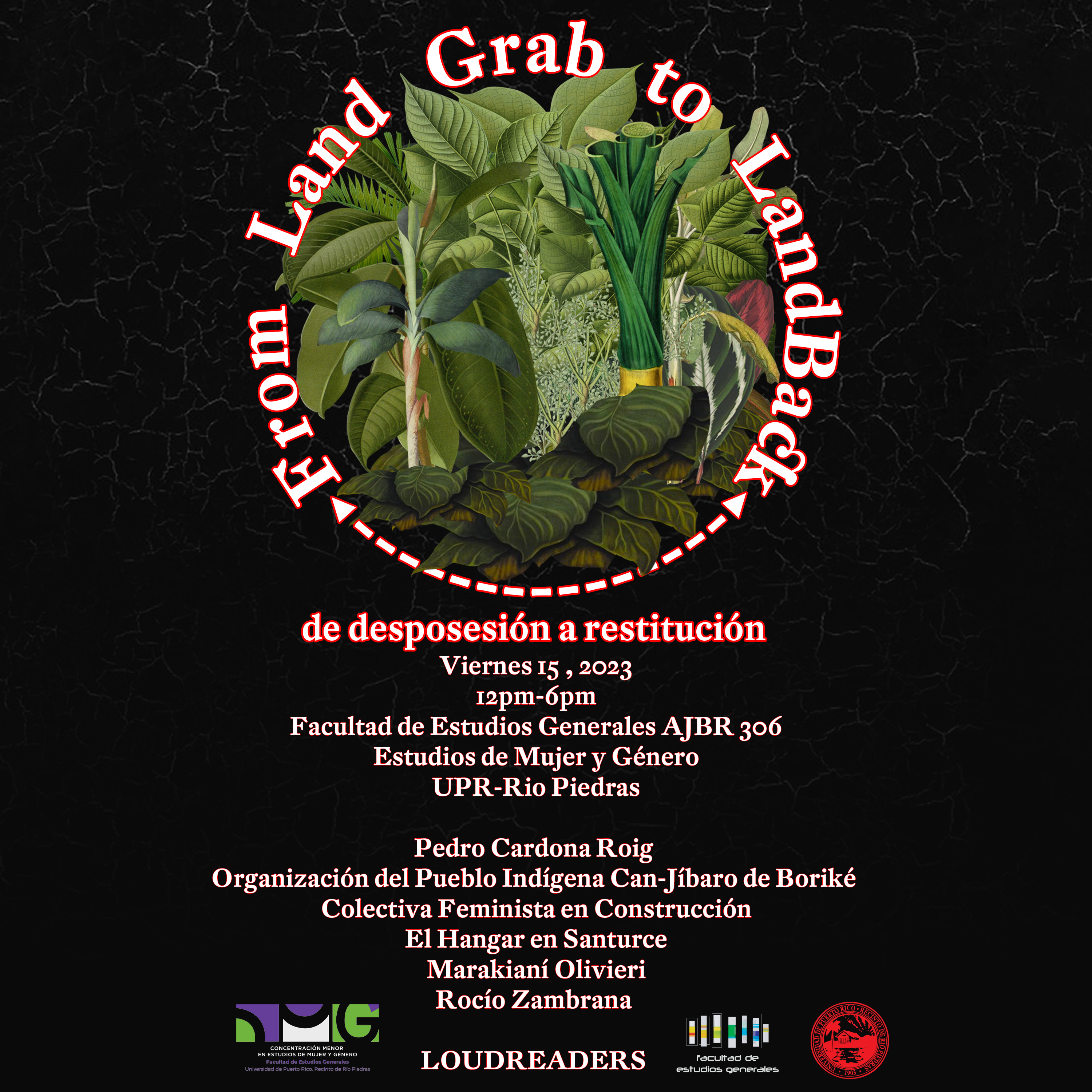

From Land Grab to LandBack Johannesburg included a podcast discussion organized by Simphiwe Mlambo Nomalanga MahlanguOratile Mothoagae Naadira Patel